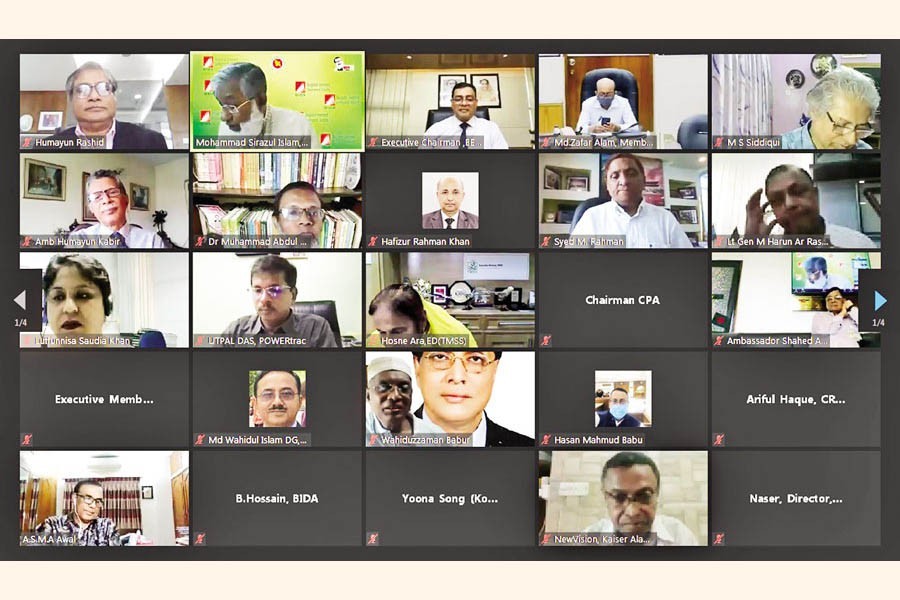Starting a business: Unlike Bangladesh's 19.5 days, OECD nations need 9.2

Published :
Updated :

Starting a business in Bangladesh needs 19.5 days, whereas the same in South Asia requires 14.5 days and just 9.2 days in the high-income OECD countries.
A construction permit in Dhaka requires 281 days while it is nearly 150 days in South Asia and 152 days in OECD (Organisation for Economic Cooperation and Development) countries.
Property registry in Dhaka requires 264 days while it needs 108 days in South Asia and nearly 24 days in OECD countries.
Getting electricity requires 115 days in Dhaka, 86 days in South Asia and nearly 75 days in OECD countries.
Such a picture was painted in a paper presented by an official of the Bangladesh Investment Development Authority (BIDA), formerly the Board of Investment, during a webinar on Monday.
Jibon Krishna Saha Roy, director (One Stop Service and Regulatory Reform) at the BIDA, presented the keynote during a webinar co-hosted by the International Business Forum of Bangladesh (IBFB) and the Bangladesh Enterprise Institute (BEI).
Humayun Rashid, president at the IBFB and managing director of Energypac Power Generation, moderated the event styled 'Ease of doing business: Status of 2021'.
BIDA executive chairman Md Sirazul Islam joined the programme as the guest of honour while BEI president Ambassador M Humayun Kabir delivered an address of welcome.
MS Siddiqui, legal economist and IBFB vice-president, former NBR chairman Dr Abdul Mazid, Chattogram Port Authority chairman Rear Admiral M Shahjahan, Bangladesh Export Processing Zones Authority (BEPZA) executive chairman Major General Md Nazrul Islam spoke as discussants.
However, BIDA director Mr Roy said the government has taken multiple reform programmes to reduce the time for starting business and other matters in Bangladesh.
Parliament has amended the Companies Act to reduce the time and make a hassle-free business environment, he said.
"The time for issuing a trade licence in Dhaka and Chattogram has been reduced to two days from a week for businesses registered with the RJSC."
Mr Roy said the government has also made some progress in reducing time to obtain clearance certificates from agencies required for construction permission.
On getting electricity, the BIDA official said the time to obtain permission for underground cable installation was reduced to three days from 21 days earlier.
"Time to obtain an electrical license is reduced to seven days from 29 days," he mentioned.
BIDA executive chairman said obtaining double digits in the ease-of-doing business ranking of the World Bank is not easy.
"Reaching 99 is very tough for us as implementation of reforms is not an easy task in the country."
The government has executed many reforms for improving the doing business ranking but it will not bring any result unless the private sector endorses those.
He said the BIDA was formed in light of the Malaysian Investment Development Authority (MIDA), adding: "We're handicapped in comparison with the MIDA".
Citing an experience of bribery in terms of remitting money by a foreign company, the BIDA chief said such types of problems are still existent.
Addressing the event, Dr Mazid said there is a need for assessment of progress. "We need to see the development made after conducting reforms".
"We need to watch the man who is behind the implementation, is he honest? Is he corrupt?" he cited.
Referring to the early stage of formation of the BoI, Dr Mazid said: "A group of employees were involved in an unethical practice in disguise of lobbying on behalf of entrepreneurs or investors."
He said the taxman has a discretionary power and they apply it on taxpayers.
During his tenure as the NBR chief, Dr Mazid said, he had tried to axe it. "We had very limited success on the discretionary power of the taxman."
There was an Ombudsman in Bangladesh but it was scrapped in 2011, although the same exists in 117 counties, he cited.
The ex-NBR chief said one of the main functions of the office of the Ombudsman is to maintain justice in the tax system.
jasimharoon@yahoo.com


 For all latest news, follow The Financial Express Google News channel.
For all latest news, follow The Financial Express Google News channel.